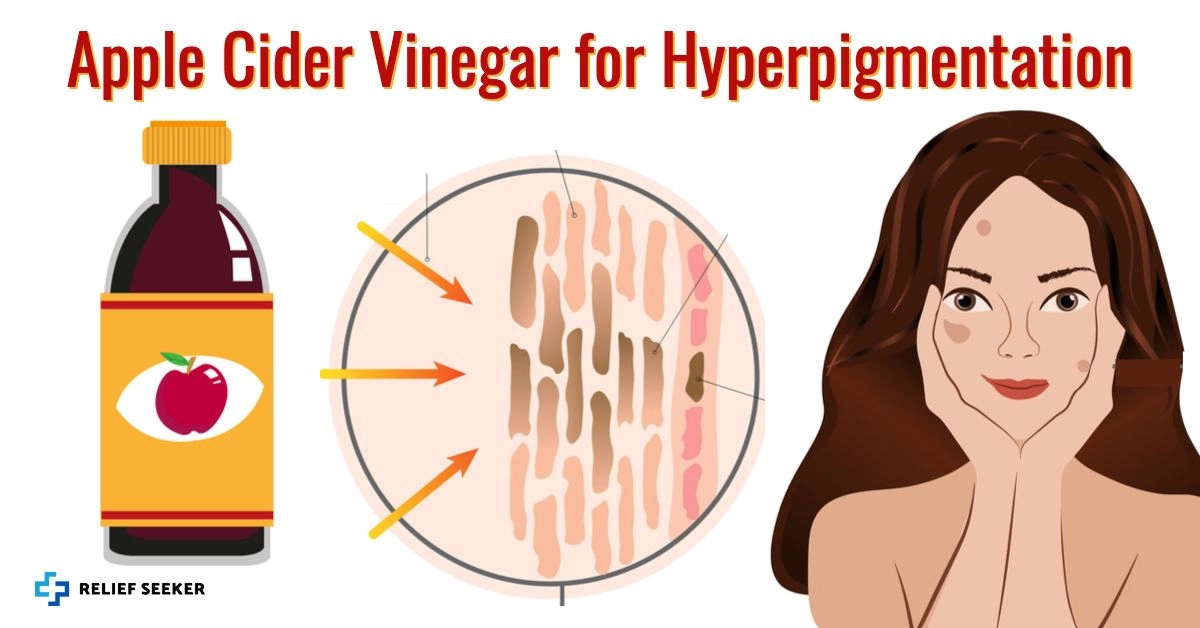Apple cider vinegar has been used to treat a long list of conditions for centuries. While we no longer use ACV as an antibiotic, this ingredient can be used to fight topical bacterial infections and as a natural exfoliant — two steps necessary in treating and preventing hyperpigmentation.
But do home remedies actually work for severe skin issues? Are they safe? Will they deliver flawless skin? Find out the benefits of using apple cider vinegar for hyperpigmentation and when you may want to opt for traditional skincare products instead.
Hyperpigmentation Causes
Hyperpigmentation is skin discoloration caused by overexposure to the sun, hormonal imbalances, pregnancy, and some prescription medications.
Also called melasma, this skin condition is most commonly associated with pregnancy (its nickname is the mask of pregnancy) and is caused by hormonal fluctuations. Most women find their hyperpigmentation naturally fades after the end of the pregnancy (though this isn’t always the case for everyone).
It’s caused by pockets of melanin (skin’s natural pigmentation) in the skin. People that live in sunnier climates often suffer from this condition at higher rates as they’re more likely to develop sun damage.
Hyperpigmentation also happens naturally with age. Older adults tend to develop sun spots or age spots (especially on their hands and chest).
Benefits of ACV for Skin
ACV totes several benefits when it comes to skincare. ACV contains acetic acid and malic acid; acetic acid has antibacterial and antifungal properties, and malic acid is a natural exfoliant.
This means that ACV can be beneficial for a long list of skincare issues, including blemishes, blackheads, whiteheads, hyperpigmentation, and scarring. Using ACV as a toner or face wash can help reduce bacteria build-up on the dermis and keep pores unclogged.
Since hyperpigmentation is caused by a build-up of pigmentation, it can be remedied through consistent, gentle exfoliation.
How Does ACV Fade Hyperpigmentation?
ACV contains acetic acid, which can be used to brighten dark spots and promote glowing skin. Acetic acid can bleach the skin, break up pockets of skin pigmentation, and prevent further skin damage.
ACV helps to break up hyperpigmentation and prevents further breakouts by:
Exfoliating dead skin cells
Keeping skin free of bacteria
Lightening the skin
Exfoliates Dead Skin Cells
Sometimes hyperpigmentation can be caused by a buildup of dead skin cells. When old cells aren’t shed properly, they can build up on the skin. This can also be caused by an overproduction of collagen (such as in acne scarring).
When your skin cells reproduce but don’t shed, you end up with dark patches. This is common after the skin is broken or damaged — especially after blackhead, whitehead, or acne extractions.
Cleanses Skin
ACV is also a known antibacterial ingredient. To prevent hyperpigmentation in the form of acne scarring, you’ll want to prevent pimples altogether. You can do this by cleansing your skin morning and night and using a toner if you have oily skin. ACV can even be used as a toner when diluted with water.
Lightens Pigmentation
Acetic acid, the active ingredient in ACV, can help break up pockets of pigmentation in the skin when used over time.
ACV Skin Care Precautions
While most skincare companies that manufacture products containing ACV will have you believe that this ingredient is a miracle cure for just about every skin condition under the sun, it does have some risk factors, too.
Whenever you apply any acidic substance to your skin, you run the risk of damaging your dermis or disrupting the natural pH balance of your skin.
People with sensitive skin shouldn’t use ACV (or use it under the supervision of a dermatologist or esthetician). This ingredient should also never be used on irritated, burned, or sunburned skin.
ACV for Hyperpigmentation Pros and Cons
Like any skin product (especially home remedies), using ACV for hyperpigmentation comes with both upsides and downsides.
ACV for Hyperpigmentation Pros
The most common benefits of ACV for skin are that its:
Inexpensive
Readily available
All-natural
ACV for Hyperpigmentation Cons
Common complaints of using ACV for hyperpigmentation include:
Strong smell
Somewhat ineffective compared to other products
Not for sensitive skin
How Long Does It Take for ACV to Lighten Dark Spots?
Since ACV is a home remedy for hyperpigmentation, there’s no guarantee as to how long skin lightening should take.
Results may depend on your skin type, the severity of your hyperpigmentation, and the reason for your skin condition. Yet, most people report seeing results after 6-to-18 months.
Other factors may also lead to longer lightening times, including sun exposure, medication side effects, and hormonal imbalances. If the cause of your hyperpigmentation hasn’t gone away (you’re pregnant or still taking a medication that causes dark spots), you may not see results at all. (You should always talk to your doctor before switching or stopping any medication.)
ACV Alternatives for Hyperpigmentation
If you suffer from sensitive skin or want faster results than ACV can provide, there are plenty of products available to treat hyperpigmentation. Not only do some skincare products have ACV listed on their ingredient lists, but there are also other products with ingredients that are much more effective for treating hyperpigmentation than ACV.
ACV Skincare Products
You’ll find plenty of skincare products specially formulated for hyperpigmentation, acne, and other skin issues both online and in big-box stores.
Many of these products contain ACV as the main ingredient but also include other ingredients that can help counteract some of the side effects of ACV and boost this vinegar’s hyperpigmentation-breaking power.
These products are ideal for those with mild-to-moderate hyperpigmentation.
OTC Hyperpigmentation Skincare
Most drugstores, big-box retailers, and department stores sell over-the-counter (OTC) skincare to lighten skin and break up pigmentation.
These products are available at a wide variety of price points (and are usually under $30). While OTC skincare is very affordable, it often contains too little of its active ingredients as it’s formulated for the vast majority of skin types — not each individual’s skin type. OTC products are also not usually recommended for people with sensitive skin.
Prescription Skincare Products for Hyperpigmentation
If you suffer from moderate-to-severe hyperpigmentation, you may want to opt for prescription skincare.
Online dermatologists like Musely and Rory specialize in personalized skincare for hyperpigmentation, dark spots, rosacea, and patchy skin. Simply log on to the site, fill out a form with your symptoms, and chat with a dermatologist. Your personalized prescription hyperpigmentation treatment will be mailed directly to your home or office.
One of the most common reasons to opt for prescription skincare is that you’ll never end up with a product that contains too much or too little of an active ingredient. Using a product with too much of an active ingredient could disrupt the natural pH balance of your skin, while using a product with too little of an active ingredient may not work effectively.
How to Use Apple Cider Vinegar for Hyperpigmentation
Using ACV is relatively easy. Simply dilute the vinegar with two parts lukewarm water to one part vinegar and dab on the pigmented areas, including freckles, patches, and acne scars, with a cotton ball.
You can use ACV as a face wash or dab on problem areas to use as an exfoliant or toner.
It’s important to always dilute ACV before using it. Applying ACV directly to your skin can cause burns and scarring. Always test your ACV solution on the inside of your elbow before applying it to your face. Keep ACV away from your eyes, as the solution can cause severe reactions, including irritation and corneal injury.
Preventing Hyperpigmentation
In addition to treating your hyperpigmentation, you’ll also want to prevent this condition in the future. Making a few lifestyle adjustments can help prevent hyperpigmentation, ensuring the money and time you spend treating this condition doesn’t go to waste.
Use Sun Protection
Overexposure to the sun’s harmful UV rays is one of the main causes of hyperpigmentation. This is why it’s important to protect your skin — especially if you live in a sunny or hot climate.
Wear long layers as much as possible to protect your arms, face, hands, legs, and feet from UV rays. Wear sunscreen with an SPF of 30 or higher. You may also want to wear a moisturizer that protects from environmental damage, including from issues like pollutants, heavy metals, and smoke.
Exfoliate Your Skin
Use a gentle exfoliant to allow your skin to shed properly. Don’t ever use harsh exfoliants (such as scrubs) on your face, as these can disrupt your skin’s pH balance and cause more damage (and scarring).
Keep Skin Clean
Prevent future breakouts and acne scars by keeping your skin clean.
Your skincare routine should include cleansing your face in the morning and night, applying daytime and nighttime moisturizers, and clearing up breakouts, acne scars, and hyperpigmentation with spot treatments.
While using apple cider vinegar for hyperpigmentation is ideal if you suffer from mild symptoms, you may want to opt for personalized skincare if your pigmentation is moderate to severe. Yet, ACV can help to keep your dermis looking fresh when used to prevent future breakouts.


